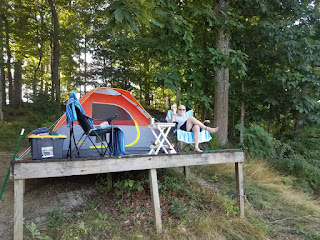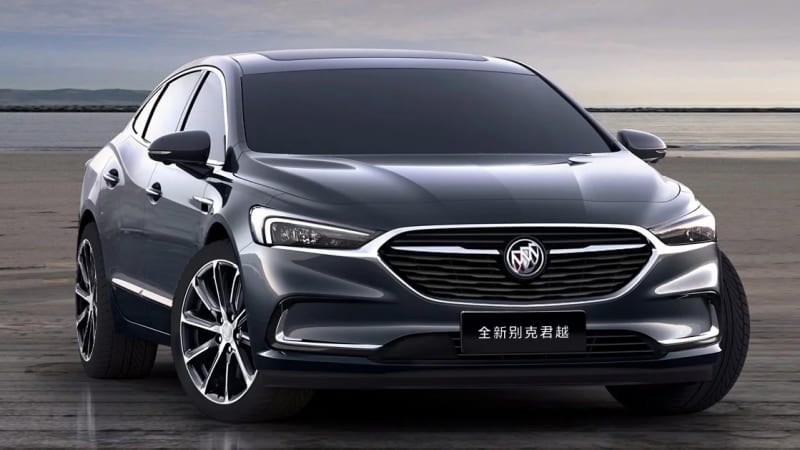Are camping cabins a good value?
A while back I wrote a blogpost about camping cabins and opined that they might be a good value for people who don't want to spend the money on a motel room, but don't want to sleep in a tent, either. We recently completed a 3700 mile journey across the United States, staying in several camping cabins, both at private RV parks and State parks as well as staying in motels and even camping in a tent on one occasion.
Tenting isn't so bad, particularly on a nice lake...
Overall, the camping cabins represented a good value, particularly for families, compared to the cost of a motel room. The cost of a camping cabin can run from as little as $50 to over $100. They generally sleep about four or five people for a standard cabin, although some cabins are more elaborate and have actual separate bedrooms.
The original KOA camping cabins generally have a queen-size bed that will sleep a husband and wife as well as a bunk bed that will sleep two or three children. Thus, if you have a small family, a camping cabin can be a good value.
However, the accommodations are very sparse and rustic. You have to bring your own sheets or a sleeping bag (as we did) as there are no amenities provided in the cabins. Most cabins do not have a bathroom, kitchen, sink, or other amenities, and thus you have to walk to a communal restroom to use the bathroom or shower or shave. If you are expecting things like carpeting, a bathroom, a television, and a mini-fridge, you may be disappointed.
However, some deluxe cabins have many of these features. We rented one cabin which was brand-new, that featured a microwave, small refrigerator, coffee maker, television, and bathroom and sink - although only with cold water. Oddly enough, this is one of the cheaper cabins we rented on the entire journey. The cost of the cabins depends more on the popularity of the location then the amenities involved, in a general sense. It is the same with motel rooms. If you want to rent a motel room in peak season in a popular tourist destination, it's going to cost a lot more than one in a remote area, even if the one of the remote area has better amenities.
It is interesting to see what sorts of people stay in camping cabins. For the most part they are families with multiple children who are taking advantage of the fact that these cabins can accommodate a number of people at a very low cost. This an entirely separate group from those who are staying in tents, or those who are RVing in their motorhomes or trailers. Seeing both sides of the equation provides us with a unique outlook.
Most of the cabins were pretty standard in their accouterments. The KOA camping cabins usually have a porch swing and sometimes a bench or chair opposite that. Inside, it's usually some sort of desk and sometimes a chair in addition to the queen size bed and bunk beds. Sometimes, but not always, they provide a nightstand or bench or other piece of furniture inside. But not always.
If there are more than one or two people staying in the cabin, it pays to have some sort of folding chair and maybe small folding table, as sometimes the furniture is limited. And it goes without saying that you have to bring your own pillows, sheets or sleeping bag, and towels and other necessities. They don't provide little soaps and shampoos that a motel might provide.
We stayed in a couple of State Park cabins and those were pretty well appointed. They usually provide a more bucolic experience. One in particular had a beautiful view of the forest instead of the view of the people across the street. It was, for some reason, very infested with flies which we spent some time killing. Be sure to bring some bug spray - or better yet some tiki torches or citronella candles. While traveling through Montana we saw a billboard advertising fly control for log cabins. I don't know if log cabins attract flies or not, but maybe it's a thing in that particular part of the country. In the Pacific Northwest, for some reason, we see absolutely no insects whatsoever or, for that matter, squirrels. Maybe it is paradise - although it has yet to rain.
One disadvantage of the camping cabin, like the motel room, is that you constantly have to schlep your things from the car to the room. In the cabin, this is not so much a problem as usually you can back your car right up to the front entrance to unload your stuff. Nevertheless, it pays to have most of your essentials into one small bag rather than have large suitcases to drag in, as there is usually no place to put them. It's better to have a small bag with your sleeping clothes and your toiletries and the clothing for the next day, rather to drag some big samsonite suitcase and try to prop it up somewhere. This would be especially true if you have children.
Most of the cabins in warmer climates had air conditioning and most had some sort of heater. There's usually a central overhead lamp and outside lamp and maybe one or two outlets. You might want to bring a small lamp, candle, or flashlight because the overhead lighting can be very harsh. This is rustic camping and you are expected to make do with what you have, rather than complain about it. It's not for every one, particularly fussy kitties.
Most cabins have a picnic table and a fire ring, and so you can experience the camping lifestyle by having a campfire and eating out of doors. However, we noticed that most people tend to drive off to the local fast food emporium, bring the food back, and eat soggy warm french fries on the picnic table. To each their own.
Others called out for takeout food such as pizza and chicken wings, which were delivered to the park, particularly in urban areas. But some parts, particularly Kampgrounds of America (or KOA) have offered dining options, including barbecue meals in the evening, ice cream socials, and pancake breakfast or sausage gravy and biscuits in the morning. So you would not have to leave the property in order to get a meal. But not all campgrounds provide these amenities, so sure to call ahead or check their website to be sure.
We built a truck box from the remains of our previous expedition kitchen which was in the back of our Nissan. It was a simple matter to cut the pieces of wood to fit a propane stove we purchased from a junk shop, as well as or propane miniature barbecue grill and a toaster oven from Walmart. That, along with a tote containing various ingredients and fixings makes for an easy fold-down kitchen which we keep in the back of the truck.
We've been in a number of these camping cabins over the years, particularly on this last trip. We've stayed in CCC cabins built in the 1930s on the Blue Ridge Parkway, as well as log lodges and motels. The camping cabins are an interesting alternative to motel rooms, and sort of a compromise between the motel and the tent. They're not for everyone, but then again what is?
While the Camping Cabin experiment was interesting, odds are, we won't be staying in one again, for a long, long time.
KOA offers a discount of 10% on the camping cabins if you join their frequent flyer club. If you save up enough points you might get $0.05 off on a cup of coffee. Actually this isn't true, if you get so many thousand points you might get a free night stay after many weeks. But like most of these Frequent Flyer points programs, chasing points is kind of fruitless. The Mr. See loves this sort of thing so I indulge him.
All of this, of course, comes crashing to the ground tomorrow we go to pick up our new trailer. Once we have that, we become trailer people, never to cross paths with camping cabin people ever again, even though we are in the same RV Park. But it has been an interesting and enjoyable experience although it's not really rustic camping that some hardcore people would have.
But in terms of a dollar value proposition, it can be worthwhile.










